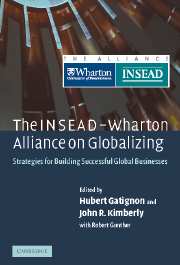Book contents
- Frontmatter
- Contents
- List of figures
- List of tables
- Notes on contributors
- Foreword
- Acknowledgments
- 1 Globalization and its challenges
- Part I Leading the global organization
- Part II Global market participation
- Part III Managing risk and uncertainty
- 11 Cross-border valuation: the international cost of equity capital
- 12 Managing risk in global supply chains
- 13 Global recombination: cross-border technology and innovation management
- 14 From corporate social responsibility to global citizenship
- 15 Colliding forces: domestic politics and the global economy
- 16 Global implications of information and communication technologies (ICT)
- Part IV Implications and conclusions
- Author index
- Subject index
15 - Colliding forces: domestic politics and the global economy
from Part III - Managing risk and uncertainty
Published online by Cambridge University Press: 14 January 2010
- Frontmatter
- Contents
- List of figures
- List of tables
- Notes on contributors
- Foreword
- Acknowledgments
- 1 Globalization and its challenges
- Part I Leading the global organization
- Part II Global market participation
- Part III Managing risk and uncertainty
- 11 Cross-border valuation: the international cost of equity capital
- 12 Managing risk in global supply chains
- 13 Global recombination: cross-border technology and innovation management
- 14 From corporate social responsibility to global citizenship
- 15 Colliding forces: domestic politics and the global economy
- 16 Global implications of information and communication technologies (ICT)
- Part IV Implications and conclusions
- Author index
- Subject index
Summary
While the economy is global, politics and political institutions are still, for the most part, local or national. This set of colliding regulatory and business forces creates tremendous complexity for global businesses that must work across a patchwork of fragmented national and regional regulations. In this chapter, the authors examine some of the complexities of this political and economic terrain through two cases. The first case considers the differences in views of the privacy of personal data between the United States and the European Union that have come to the fore in discussions of the Safe Harbor negotiations. The second case examines the challenges in developing a global information and communications technology (ICT) infrastructure, spearheaded by the US Global Information Infrastructure (GII) initiative. Both of these cases illustrate the challenges of managing global operations in a world of local politics and the importance of deeply held cultural beliefs in shaping the advance of global regulations. They also show that, paradoxically, in a globalizing world, domestic regulations are becoming increasingly important.
In March 2003, Porsche, the German sports car manufacturer, abandoned plans for an offering on the New York Stock Exchange because of its opposition to the Sarbanes–Oxley Act. The Act, which was passed in reaction to the “Enron” corporate scandals, requires all firms listed on American markets to comply with new governance standards, including a requirement that chief executive officers attest to the accuracy of financial statements.
- Type
- Chapter
- Information
- The INSEAD-Wharton Alliance on GlobalizingStrategies for Building Successful Global Businesses, pp. 353 - 377Publisher: Cambridge University PressPrint publication year: 2004

